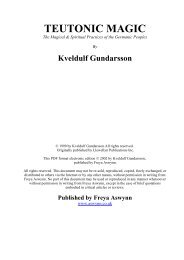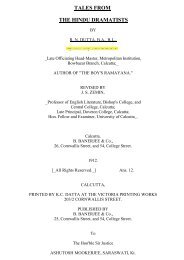Untitled - Awaken Video
Untitled - Awaken Video
Untitled - Awaken Video
Create successful ePaper yourself
Turn your PDF publications into a flip-book with our unique Google optimized e-Paper software.
Chapter 5. The Underworld 137<br />
well-being is spent in maintaining the illusion of immortality. Because of immortality,<br />
or the illusion of such, one can afford to believe that all of life’s little details are<br />
of greatest importance, and because everything thing is important to such a great<br />
magnitude, many spend their illusory immortal years pondering the “right decision.”<br />
In this sense, the ancient Scandinavian knew where the source of wisdom truly lay:<br />
in the Underworld, the Land of the Dead. These “great decisions,” most of which<br />
are little more than silly pontifications made great only by the amount of time and<br />
energy put into them, can usually be pared down to realistic proportions in the face<br />
of one’s own demise. If one is going to be put under the grass tomorrow, a great<br />
decision like whether to “buy American” or to “go with a Japanese model” becomes<br />
relatively meaningless and trivial. Contemplation of death and mortality carries the<br />
message that there really are very few “big” decisions, and in this way, ancestral<br />
wisdom can be utilized.<br />
There is an interesting phenomenon which seems to be common to those nearing<br />
death: they tend to drop all the meaningless little details of life, the things that<br />
they once thought were so important, and try to put their lives in order before they<br />
die. They call their family together, atone for harm they have brought to others<br />
or to hose they have neglected through the years, and, in general, attempt to deal<br />
with only those things that are truly important. Most curiously, those are the very<br />
things about which the Hávamál speaks: family, friendship, quality of a life lived,<br />
and the prospect of leaving a fair name for oneself. The entire chaotic list of life’s<br />
little details fall together for the very first time in many cases, so that only the truly<br />
important things carry meaning. Without an Underworld tradition, modern man<br />
must wait until he is confronted with the reality of death before the true meaning<br />
of life, the wisdom of the ancestors, makes itself known.<br />
The Germanic concept of Midgard has much to do with people’s desire and<br />
ability to place themselves spatially in the universe utilizing the constructs of the<br />
World Tree and the Flow of the Waters of Life. Within such a world view, each<br />
has a place and a function which is not separated from anything else (see Chap..<br />
3). This is not difficult to accept or realize because it is observable in the world<br />
at large. On the other hand, the Underworld tradition is only observable in the<br />
effects that it has on people’s behaviors, in their sense of well-being, and in their<br />
personally-experienced quality of life. That those who have undergone near-death<br />
experiences have been changed by the experience is rarely doubted, but exactly<br />
what has been changed is not always clear. These changes cannot be seen directly<br />
but can only be experienced, and experience without physical evidence is difficult<br />
for the 20 th century mind. The tradition of Midgard places one spatially within<br />
families, communities, and the World Tree, but the Underworld tradition places one<br />
temporally.
















